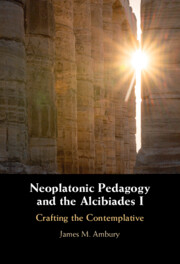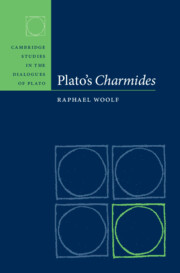60 results
What Do We Owe Our Genetic Relatives?
-
- Journal:
- Journal of the American Philosophical Association , First View
- Published online by Cambridge University Press:
- 20 March 2025, pp. 1-19
-
- Article
-
- You have access
- Open access
- HTML
- Export citation
Knowing One’s Nature as Self-Knowledge
-
- Journal:
- New Blackfriars / Volume 106 / Issue 1 / January 2025
- Published online by Cambridge University Press:
- 16 January 2025, pp. 13-26
- Print publication:
- January 2025
-
- Article
- Export citation
9 - Pamprosopon
- from Part III - Intellect
-
- Book:
- Plotinus on the Contemplation of the Intelligible World
- Published online:
- 03 September 2024
- Print publication:
- 21 November 2024, pp 319-351
-
- Chapter
- Export citation
7 - All Together in Eternity
- from Part III - Intellect
-
- Book:
- Plotinus on the Contemplation of the Intelligible World
- Published online:
- 03 September 2024
- Print publication:
- 21 November 2024, pp 261-293
-
- Chapter
- Export citation
6 - Looking into Our Face
- from Part III - Intellect
-
- Book:
- Plotinus on the Contemplation of the Intelligible World
- Published online:
- 03 September 2024
- Print publication:
- 21 November 2024, pp 229-260
-
- Chapter
- Export citation
Speaking Sense: A Hybrid Source of Justification for Self-Knowledge
-
- Journal:
- Episteme , First View
- Published online by Cambridge University Press:
- 23 October 2024, pp. 1-18
-
- Article
-
- You have access
- Open access
- HTML
- Export citation
Chapter 7 - Personal Intelligences
- from Part II - Transition Expertise
-
- Book:
- Transition Expertise and Identity
- Published online:
- 30 May 2024
- Print publication:
- 06 June 2024, pp 110-144
-
- Chapter
- Export citation
Chapter 1 - The Self-Knowledge Necessity
-
- Book:
- Neoplatonic Pedagogy and the Alcibiades I
- Published online:
- 16 May 2024
- Print publication:
- 23 May 2024, pp 12-27
-
- Chapter
- Export citation
Introduction
-
- Book:
- Neoplatonic Pedagogy and the Alcibiades I
- Published online:
- 16 May 2024
- Print publication:
- 23 May 2024, pp 1-11
-
- Chapter
- Export citation
Chapter 2 - Exalting Eros
-
- Book:
- Neoplatonic Pedagogy and the Alcibiades I
- Published online:
- 16 May 2024
- Print publication:
- 23 May 2024, pp 28-74
-
- Chapter
- Export citation
Chapter 4 - What Do I Want?
-
- Book:
- Neoplatonic Pedagogy and the Alcibiades I
- Published online:
- 16 May 2024
- Print publication:
- 23 May 2024, pp 152-166
-
- Chapter
- Export citation

Neoplatonic Pedagogy and the Alcibiades I
- Crafting the Contemplative
-
- Published online:
- 16 May 2024
- Print publication:
- 23 May 2024
Chapter 2 - The Stance of Enquiry
-
- Book:
- Plato's <i>Charmides</i>
- Published online:
- 20 July 2023
- Print publication:
- 10 August 2023, pp 30-59
-
- Chapter
- Export citation
Chapter 4 - Interpreting Temperance
-
- Book:
- Plato's <i>Charmides</i>
- Published online:
- 20 July 2023
- Print publication:
- 10 August 2023, pp 145-207
-
- Chapter
- Export citation
Chapter 5 - The Art of Self-Realisation
-
- Book:
- Plato's <i>Charmides</i>
- Published online:
- 20 July 2023
- Print publication:
- 10 August 2023, pp 208-252
-
- Chapter
- Export citation

Plato's Charmides
-
- Published online:
- 20 July 2023
- Print publication:
- 10 August 2023
Demystifying the Theory of the Unity of Knower and Known: A Comparative Study of the Views of Ṣadrā and Shoemaker Regarding Self-Knowledge
-
- Journal:
- Dialogue: Canadian Philosophical Review / Revue canadienne de philosophie / Volume 62 / Issue 3 / December 2023
- Published online by Cambridge University Press:
- 01 June 2023, pp. 569-589
-
- Article
-
- You have access
- HTML
- Export citation
Self-Knowledge and the Opacity Thesis in Kant’s Doctrine of Virtue
-
- Journal:
- Kantian Review / Volume 28 / Issue 2 / June 2023
- Published online by Cambridge University Press:
- 20 April 2023, pp. 185-200
- Print publication:
- June 2023
-
- Article
- Export citation
What have I just done? Anchoring, self-knowledge, and judgments of recent behavior
-
- Journal:
- Judgment and Decision Making / Volume 10 / Issue 1 / January 2015
- Published online by Cambridge University Press:
- 01 January 2023, pp. 76-85
-
- Article
-
- You have access
- Open access
- HTML
- Export citation
Chapter 1 - Self-Consciousness
- from Part I - Recognition
-
- Book:
- Recognition and the Self in Hegel's <I>Phenomenology of Spirit</I>
- Published online:
- 01 December 2022
- Print publication:
- 15 December 2022, pp 33-77
-
- Chapter
- Export citation

